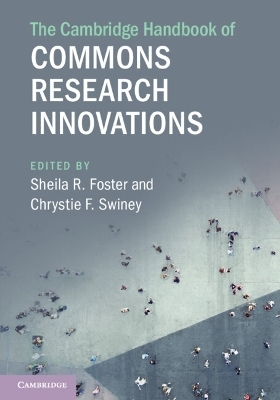
The Cambridge Handbook of Commons Research Innovations
Cambridge University Press (Verlag)
978-1-009-29571-0 (ISBN)
- Noch nicht erschienen
- Versandkostenfrei
- Auch auf Rechnung
- Artikel merken
The commons theory, first articulated by Elinor Ostrom, is increasingly used as a framework to understand and rethink the management and governance of many kinds of shared resources. These resources can include natural and digital properties, cultural goods, knowledge and intellectual property, and housing and urban infrastructure, among many others. In a world of increasing scarcity and demand - from individuals, states, and markets - it is imperative to understand how best to induce cooperation among users of these resources in ways that advance sustainability, affordability, equity, and justice. This volume reflects this multifaceted and multidisciplinary field from a variety of perspectives, offering new applications and extensions of the commons theory, which is as diverse as the scholars who study it and is still developing in exciting ways.
Sheila R. Foster is a Professor of Law and Public Policy at Georgetown University and is an award-winning authority on environmental and climate justice, urban governance, and racial inequality. Foster has served as the co-director LabGov, chair of the Global Parliament of Mayors advisory committee, and a member of the New York City's Mayors Panel on Climate Change. Chrystie F. Swiney is an attorney, legal scholar, and political scientist with an expertise in international and human rights law. She holds graduate degrees from Harvard Law, Oxford, and Georgetown, and has worked in international development for over a decade. Chrystie is a widely published author, with works including a book on the global spread of restrictive NGO laws.
Introduction: Commons research in the 21st century and beyond Sheila Foster and Chrystie Swiney; Part I. Revisiting the Origins and Evolution of Commons Thought: 1. Linking the origins and extensions of commons theory William Blomquist; 2. The tragedy of Garrett Hardin's commons Andrew P. Follet, Brigham Daniels, Taylor Petersen; 3. Kinship and commons: the Bedouin experience Haim Sandberg; Part II. Averting New Tragedies: 4, Averting tragedy of the resource directory anti-commons Greg Bloom; 5. Time and tragedy: the problem with temporal commons Blake Hudson; 6. Transforming climate dilemmas from tragedy to cooperation Bryan Bruns; Part III. New Forms of Contested Commons: 7. Urban public housing as a commons Andrea Mcardle; 8. Humanitarian aid as a shared and contested common resource Michelle Reddy; 9. The economic system as a commons: an exploration of shared institutions John Powell; Part IV. Urban Landscape and Infrastructure as a Commons: 10. Seeing New York City's urban canopy as a commons: a view from the street Rebecca Bratspies; 11. City as commons: the case study of Bologna Elena De Nictollis and Christian Iaione; 12. Urban commons architecture: collaboration spaces innovating learning within cities Sofia Croso Mazzuco; Part V. Reassessing Old and New Institutions for Collective Action: 13. Business improvement districts and the urban commons Alexandra Flynn; 14. To have and to hold? Community land trust as commons Barbara Bezdek; 15. Ostromian logic applied to civil society organizations and the rules that shape them Anthony Demattee and Chrystie Swiney; 16. A conceptual model of polycentric resource governance in the 2030 district energy program Erik Nordman; Part VI. Managing and Restoring the Commons: 17. Management of facilitated common pool resources in India Pradeep Kumar Mishra; 18. Social environmental dilemmas and governing the commons: the Itanhém river basin in Southern Bahia, Brazil Herbert Martins and Fernando Rios De Souza; 19. Social trust, informal institutions and community-based wildlife management in Namibia and Tanzania Daniel Ogbaharya; 20. Restoring the commons Itzchak Kornfeld; Part VII. Law, Legal Theory and the Commons: 21. Prior appropriations as a response to the tragedy of the commons Robert Abrams; 22. Using the public trust doctrine to manage property on the moon Hope Babcock; 23. A biotechnology regulatory commons problem David Forman; 24. Can affirmative action offer a lesson in fighting enclosure? Sheldon Bernard Lyke; Part VIII. Technology, the Internet and the Future of Commons Governance: 25. Can technological change weaken the robustness of common-property regimes Maija Halonen-Akatwijuka and Evagelos Pafilis; 26. Internet governance in the digital cold war Scott Shackelford and Angie Raymond.
| Erscheinungsdatum | 13.06.2023 |
|---|---|
| Reihe/Serie | Cambridge Law Handbooks |
| Zusatzinfo | Worked examples or Exercises |
| Verlagsort | Cambridge |
| Sprache | englisch |
| Themenwelt | Recht / Steuern ► EU / Internationales Recht |
| Recht / Steuern ► Öffentliches Recht ► Umweltrecht | |
| Wirtschaft ► Volkswirtschaftslehre | |
| ISBN-10 | 1-009-29571-3 / 1009295713 |
| ISBN-13 | 978-1-009-29571-0 / 9781009295710 |
| Zustand | Neuware |
| Informationen gemäß Produktsicherheitsverordnung (GPSR) | |
| Haben Sie eine Frage zum Produkt? |
aus dem Bereich


